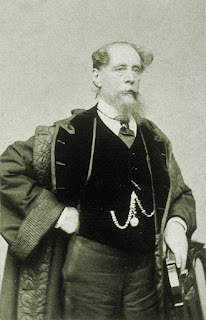Charles Dickens was born in Portsmouth on 7th
February 1812, the eldest child of a naval pay clerk. The family soon moved
away, firstly to Chatham in Kent and then to London, which was to be Charles’s
home for most of the rest of his life.
The family went through some bad times during his childhood,
and at one stage he had to work in a shoe-blacking warehouse to help support
the rest of the family.
He started writing stories and sketches while working as a
parliamentary reporter, and, once he got a story into print, he simply had to
write more. At first he used the name “Boz” as a non de plume, and his
“Sketches by Boz” proved to be highly popular.
His first novel was the somewhat rambling “Pickwick Papers”
that was really a set of farcical stories within a loose framework. However,
this was so popular with the public that Dickens was set on a full-time career
as a writer. In all he wrote 15 novels, including the unfinished “Mystery of
Edwin Drood”, as well as shorter stories that included “A Christmas Carol”.
Among his most popular novels were “Oliver Twist”, “Nicholas
Nickleby”, “David Copperfield”, “Great Expectations” and “Bleak House”.
Dickens wrote all his novels in serial form, producing
weekly or monthly parts which were sometimes part of journals containing other
material, both by himself and other writers.
Charles Dickens married Catherine Hogarth on 2nd
April 1836. They were to have ten children, nine of whom survived to adulthood.
However, the marriage eventually broke down and the couple separated in 1858,
although they were never divorced. Dickens had a secret affair with an actress,
Ellen Ternan, which continued for the rest of his life.
Dickens’s popularity was so great that he was able to make a
considerable income by giving readings of extracts from his books to audiences
across the country. He visited the United States twice during his lifetime, the
second trip, in 1867-8, being a reading tour that was highly profitable.
However the strain of constant travelling and performing
began to tell on his health and he had to give up the reading tours in 1869.
He died from a stroke on 9th June 1870, having
written his last words the day before. He had asked to be buried in Rochester
Cathedral but Queen Victoria insisted that only Westminster Abbey was a
suitable resting place for him.
© John Welford

No comments:
Post a Comment